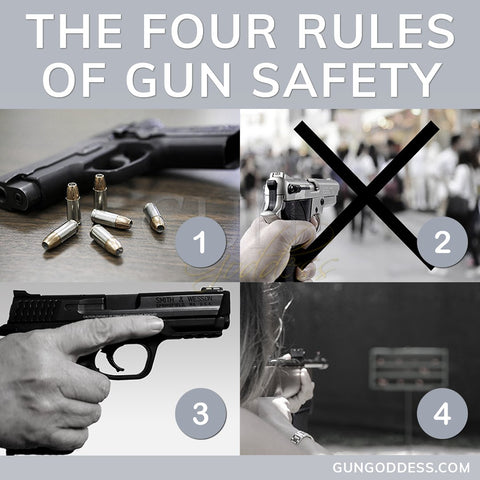Your Cart is Empty
Orders Over $100 Ship FREE (USA)!
Orders Over $100 Ship FREE (USA)!
CONCEALED CARRY
(Apparel with holster pockets or concealed-carry features)
(Apparel with holster pockets or concealed-carry features)
PARTS & GEAR
RANGE STYLE
Gift shopping & not sure about size or style? Give a gift card instead!
Gift shopping & not sure about size or style? Give a gift card instead!
GIFT IDEAS
The entire site is full of products that make great gifts, so browse all of our collections! Still not sure? Give a gift card!
The entire site is full of products that make great gifts, so browse all of our collections! Still not sure? Give a gift card!
EXPLORE
Beyond the Four Rules: Building on the Basics of Gun Safety
3 min read
Every gun owner needs to know how to safely handle and operate a firearm. The four main rules of gun safety are a good starting point, but there's a lot more to be aware of. To really make sure you're using your firearm safely, it's important to expand your knowledge past the basic safety rules.
Here are a few additional things you need to know to keep yourself and others safe with your firearm.
The First Four Rules of Gun Safety
Before we get started on the additional things you need to know, let's go over the first four rules. These rules are considered the essentials and are fundamental to responsible gun handling. Understanding and following these rules can significantly reduce the risk of accidents and make sure that both you and those around you are safe whenever a firearm is present.

Always treat guns as if they are loaded
Even if you think a gun is unloaded, always handle it as though it has ammunition in it. This careful approach helps prevent accidents, which could have devastating consequences.
Never point a gun at anything you don't want to destroy
Always pay attention to where your gun is pointed. If it were to accidentally fire, you want to be sure it wouldn’t hurt someone or something valuable. This rule helps keep everyone safe.
Keep your finger off the trigger until you're ready to shoot
Keep your finger away from the trigger and rest it along the side of the gun until you are absolutely sure you want to shoot. This prevents the gun from firing unexpectedly due to a sudden jolt or a nervous reflex.
Know your target and what’s behind it
Rounds can go through their target and travel further, potentially causing harm. Always be aware of what you are aiming at, plus make sure you know what's beyond your target. This avoids accidentally injuring someone that may be in the line of fire.
Expanded Gun Safety Rules
Now that we've reviewed the basic four rules, we're going to talk about some additional things you need to learn to make sure you're being a responsible gun owner. Here are some extra safety measures that every gun owner should follow:
Learn the Ins and Outs of Your Firearms
Get to know your gun! Before you use a firearm, familiarize yourself with how it operates, which includes knowing how to manipulate all the controls and how to load ammunition.
Make Sure You're Buying and Using the Right Ammo
Whenever you buy ammo, make sure it matches the specifications that are suitable for your gun. Using the wrong ammo can not only damage your firearm, it can also cause serious injury.
ALWAYS Wear Eye and Ear Protection When Shooting
There may be times where you're tempted to forego either ear protection or safety glasses, but you need to resist that urge. There's no way around it - gunshots are loud! Even a .22 can produce noise around 140 db, so wearing protective gear is essential. The same goes with eye protection. Every time you shoot, gases, debris, and even sometimes bullet fragments are going to be present, so you can't afford to risk your eyesight.
Don't use alcohol or drugs before or while handling firearms
Impairment and shooting do not mix. Alcohol or drugs (that includes some prescription medication) can severely hinder your judgment, coordination, and reaction times. Handling firearms while impaired is irresponsible and can seriously increase the risk of accidents.
Inspect Your Guns Often
Just like other mechanical devices, guns wear out or get damaged. Regularly inspect your firearm for signs of wear, non-functioning controls, or other damage.
Be Responsible About Storage
We're not going to tell you that you have to keep your guns locked up all the time, but we will say that responsible firearm owners make sure their guns are inaccessible to children and unauthorized people. There are lots of gun storage options available, so educate yourself and find what works best for your situation.
Educate others in your household about firearms safety
If you live with others, especially children, everyone needs to understand the dangers associated with firearms. Discussing and even enrolling family members in firearm safety courses can reduce the risk of accidental discharges or unauthorized use.
Know The Law
If you carry a firearm, it's absolutely crucial to read up on the gun laws that affect you at the federal, state, and even local levels. You should know where you're allowed to carry your gun and where it's prohibited. You also need familiarize yourself with what's considered self-defense in your area. For example, make sure you know if your state has a Castle Doctrine or Stand Your Ground Law in place.
Also in Newest Posts

Concealed Carry Choices: On-Body Versus Off-Body
4 min read
Making the choice to carry concealed? Read all about the advantages and challenges of on-body vs off-body carry.
Read More
Practical Solutions to The Most Common Pistol Malfunctions
4 min read
It's incredibly important to understand what's happening when your gun isn't working like it's supposed to, and know ahead of time how to work past the problem.
Read More
Tips for Carrying Concealed During the Summer
3 min read
Summer is here, which means carrying concealed becomes more challenging. Here are some adjustments you can make to stay more comfortable while carrying.
Read More